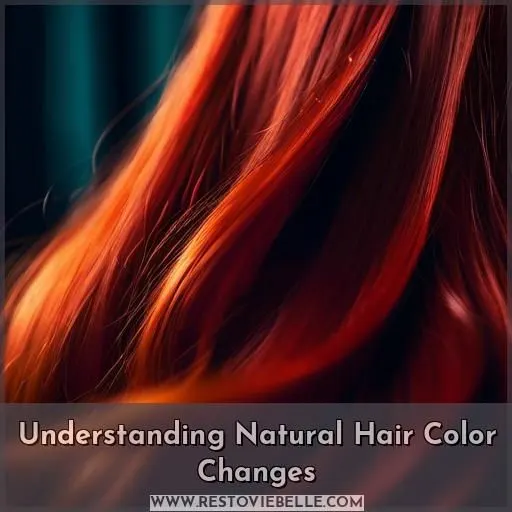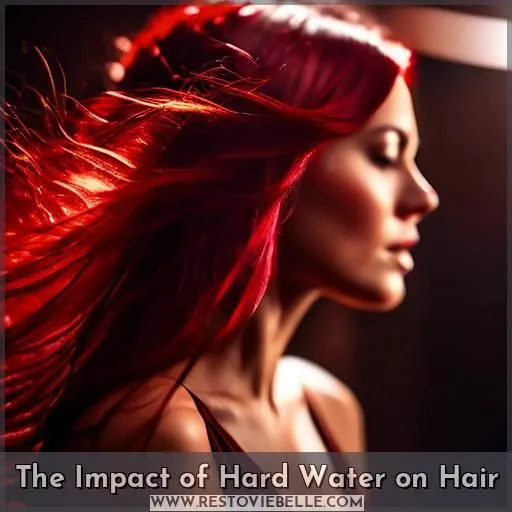This site is supported by our readers. We may earn a commission, at no cost to you, if you purchase through links.

Your hair may be turning red naturally due to a few factors. Sun exposure can trigger reddish-brown pigments in your hair. A vitamin B12 deficiency can lead to red tones.
Hard water can cause mineral build-up that weighs down your hair and prevents moisture absorption, contributing to color changes.
Your age, genetics, and even certain medications or stress can also alter your natural hair pigmentation over time.
To better understand the underlying causes and manage any unwanted red tones, continue exploring the thorough information provided.
Table Of Contents
Key Takeaways
- Sun exposure can cause hair to turn red or reddish-brown due to how sunlight reacts with the pigments in your hair.
- A vitamin B12 deficiency can lead to red tones in your hair.
- Hard water can cause mineral buildup, porosity problems, and color alteration, contributing to unwanted red tones.
- Age, genetics, and certain medications or stress can also alter your natural hair pigmentation over time.
Understanding Natural Hair Color Changes
Hair color changes naturally due to genetic variation. Fraternal twins may have different shades.
Hair growth can be influenced by a hair care routine designed to promote growth. The hair cuticle plays a role in how hair appears, with natural hair dyes like beet hair dye affecting results.
Understanding natural hair color changes involves considering factors like age, genetics, and medical conditions. Hair care can help maintain color and prevent unwanted tones.
Sun Exposure and Hair Color
Sunlight exposure can noticeably affect your hair color, often causing it to become red or reddish-brown. This is because of how sunlight reacts with the dyes in your hair. Here are four ways to safeguard your hair from sun damage:
- Sun Protection: Regularly use a sunscreen or hair oil with UV protection to shield your hair from the sun’s harmful rays.
- Avoid Direct Sunlight: Try to limit your hair’s exposure to direct sunlight, especially during peak hours.
- Beet Juice: Drinking beet juice can help protect your hair from sun damage, as it contains antioxidants that help neutralize free radicals.
- Vitamin B12: Make sure you’re getting enough vitamin B12, as a deficiency can lead to hair color changes, including red tones.
The Impact of Hard Water on Hair
Hard water can have a significant impact on your hair, causing issues like mineral build-up, porosity problems, and color alteration. Here are three ways hard water can affect your hair:
- Mineral build-up: Hard water contains minerals like calcium, magnesium, and copper, which can bond strongly to the hair, weighing it down and preventing it from absorbing moisture and retaining color.
- Porosity issues: Hard water can lead to porosity problems, making it difficult for your hair to absorb moisture and nutrients. This can result in dry, brittle hair and even contribute to hair loss in severe cases.
- Color alteration: Hard water can cause your hair color to fade prematurely or appear brassy, especially in color-treated hair.
To mitigate these effects, consider the following solutions:
- Use a shower filter: Installing a shower filter can help remove minerals from the water before it reaches your hair, preventing mineral build-up and porosity issues.
- Consult a healthcare provider: If you suspect a vitamin B12 deficiency, consult your healthcare provider for advice on supplementation to support hair health.
- Use a hair toning shampoo: To neutralize brassy undertones caused by hard water, use a hair toning shampoo specifically designed for color-treated hair.
- Avoid sulfates: Sulfates can strip your hair of its natural oils and exacerbate the effects of hard water. Opt for sulfate-free hair care products to maintain hair health.
- Retain moisture: Keep your hair hydrated by using moisturizing hair care products and avoiding excessive heat styling, which can cause damage and make your hair more susceptible to hard water’s effects.
Diet and Vitamin B12 Deficiency
Your diet can have a significant impact on the health and color of your hair. A deficiency in vitamin B12 can lead to premature graying and loss of hair color. To maintain healthy hair, make sure you consume a balanced diet rich in vitamin B12, which is found in animal products like meat, dairy, and eggs. If you’re vegan or vegetarian, consider including fortified foods or taking supplements to meet your daily requirements.
If you’re experiencing hair color changes and suspect a vitamin B12 deficiency, consult with a healthcare professional for advice on supplementation. They can help you determine the appropriate dosage and monitor your progress.
Age, Genetics, and Medical Factors
Your hair color is largely determined by your genetics. As you age, the natural pigmentation in your hair can change, causing a shift in the direction of more reddish tones.
The Role of Genetics in Hair Color
Ever wondered why you’re the redhead in a family of brunettes? It’s all in the genes. Genetic variation and inheritance patterns play a huge role in hair color. Fraternal twins can even sport different shades! Considering genetic testing? It might just reveal fascinating pigmentation changes in your lineage.
How Age Affects Hair Pigmentation
As you age, your hair may change color due to a variety of factors. One of the primary reasons is hormonal changes, which can influence the production of melanin, the pigment responsible for hair color. Hormonal shifts during puberty and throughout adulthood can lead to changes in hair color, making it darker over time.
Additionally, the distribution of hair color may become more apparent with age, leading to variations such as gray or white hairs.
Medications and Stress as Contributing Factors
Medications and stress can contribute to changes in hair color, including the development of red tones. Stress can affect the hair color by activating pigment-producing stem cells too early, causing them to move away from the hair follicle’s color reserves, resulting in premature graying or white hair. Stress can also lead to changes in the levels of proteins in the hair, which can affect hair color.
Medications, particularly those with anti-inflammatory properties, can also induce gray hair repigmentation, although the mechanisms behind this aren’t yet fully understood. Some vitamins, such as calcium pantothenate and para-amino benzoic acid, have been found to promote gray hair darkening, although they aren’t currently indicated for the treatment of gray hair.
To manage stress and its effects on hair color, it’s essential to maintain a healthy lifestyle, including regular exercise, a balanced diet, and adequate sleep. Additionally, stress management techniques, such as meditation, yoga, or therapy, can help reduce stress levels and potentially prevent or reverse graying hair.
Managing and Preventing Unwanted Red Tones
If you’re noticing unwanted red tones in your hair, consider using a shower filter to reduce mineral build-up. Additionally, consulting a healthcare provider about vitamin supplementation can help maintain your hair’s health and prevent undesirable color changes.
Using a Shower Filter for Mineral Build-Up
Shower Filter: Your Secret Weapon Against Mineral Build-Up
If you’re dealing with unwanted red tones in your hair, a shower filter might just be your new best friend. Here’s why:
- Reduces Mineral Build-Up: Hard water can lead to mineral build-up, which can discolor your hair. A shower filter removes these minerals, preventing hair discoloration.
- Protects Against Hair Damage: Mineral build-up can also cause hair damage. By filtering out these minerals, you’re protecting your hair from damage.
- Improves Hair Health: A cleaner shower environment means healthier hair. Plus, it can help reduce the need for frequent shampooing, which can be drying.
- Easy to Install: Most shower filters are easy to install and maintain. It’s a small change that can make a big difference.
- Cost-Effective: Compared to other hair care treatments, a shower filter is a cost-effective solution to combat mineral build-up and hair discoloration.
Vitamin Supplementation for Hair Health
You may be questioning whether your hair’s transition to red could be attributed to a shortage of vitamin B12. This vitamin has a significant impact on hair growth and vitality.
If you suspect a deficiency, reach out to a healthcare professional for guidance on supplementation. By addressing this matter, you can enhance the overall health and aesthetic appeal of your hair.
Frequently Asked Questions (FAQs)
Can hormonal changes cause hair to redden?
Yes, hormonal changes can indeed cause your hair to redden naturally. Fluctuations in estrogen, testosterone, and thyroid hormones can trigger pigment production, leading to a reddish hue in your locks.
Does emotional stress influence hair color shifts?
Woah, stress can truly cast a reddish spell on your locks! While genetics play a pivotal role, emotional turmoil prompts pigment shifts that’ll make your hair look like a fiery sunset. Don’t sweat it, though – it’s just your body’s way of venting.
How does pregnancy affect natural hair color?
During pregnancy, your hormones surge, which can cause your natural hair color to change or become more intense – often appearing redder. However, this shift is temporary and should revert after giving birth.
Can certain illnesses lead to hair reddening?
As vibrant as a sunset, reddish locks may whisper of an underlying condition – iron deficiency anemia or thyroid issues could be painting your tresses a fiery hue. It’s nature’s subtle cue to consult your doctor for a health checkup.
Is there a seasonal pattern to hair color changes?
Yes, there can be! You might see your red tones deepen in winter and lighten up during summer’s sunshine and humidity. Think of it as nature’s own highlights package – no salon required!
Conclusion
Unraveling the intricate web of causes behind your naturally reddening hair may seem like deciphering an enigmatic riddle.
But with a thorough understanding, you’ll illuminate the path to regaining your desired shade.
By tackling the impact of sun exposure, hard water, nutritional deficiencies, age, genetic predispositions, and medical conditions that contribute to the unwelcome red undertones, you’ll seize command over your inherent hair pigmentation.
Guaranteeing a vibrant, radiant look that harmonizes with your singular charm.












